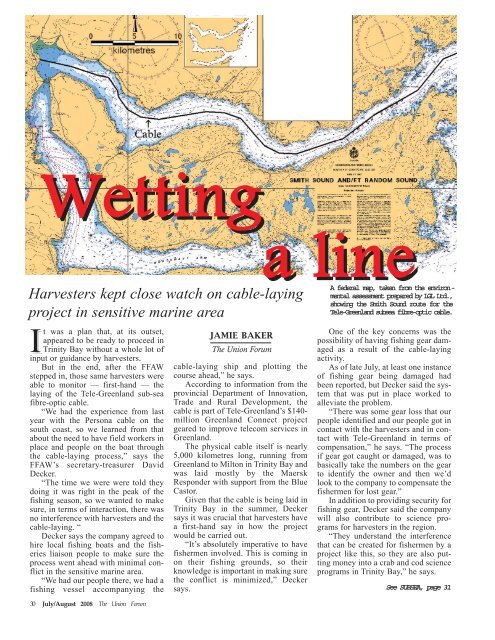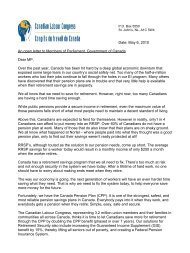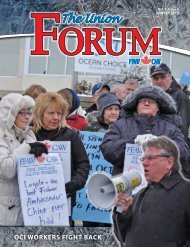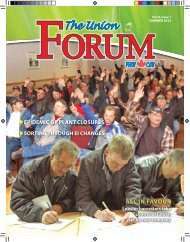The Union Forum - July-Aug 2008 - Fishermen, Food and Allied Workers
The Union Forum - July-Aug 2008 - Fishermen, Food and Allied Workers
The Union Forum - July-Aug 2008 - Fishermen, Food and Allied Workers
You also want an ePaper? Increase the reach of your titles
YUMPU automatically turns print PDFs into web optimized ePapers that Google loves.
Wetting<br />
a line<br />
Harvesters kept close watch on cable-laying<br />
project in sensitive marine area<br />
It was a plan that, at its outset,<br />
appeared to be ready to proceed in<br />
Trinity Bay without a whole lot of<br />
input or guidance by harvesters.<br />
But in the end, after the FFAW<br />
stepped in, those same harvesters were<br />
able to monitor — first-h<strong>and</strong> — the<br />
laying of the Tele-Greenl<strong>and</strong> sub-sea<br />
fibre-optic cable.<br />
“We had the experience from last<br />
year with the Persona cable on the<br />
south coast, so we learned from that<br />
about the need to have field workers in<br />
place <strong>and</strong> people on the boat through<br />
the cable-laying process,” says the<br />
FFAW’s secretary-treasurer David<br />
Decker.<br />
“<strong>The</strong> time we were were told they<br />
doing it was right in the peak of the<br />
fishing season, so we wanted to make<br />
sure, in terms of interaction, there was<br />
no interference with harvesters <strong>and</strong> the<br />
cable-laying. “<br />
Decker says the company agreed to<br />
hire local fishing boats <strong>and</strong> the fisheries<br />
liaison people to make sure the<br />
process went ahead with minimal conflict<br />
in the sensitive marine area.<br />
“We had our people there, we had a<br />
fishing vessel accompanying the<br />
30 <strong>July</strong>/<strong>Aug</strong>ust <strong>2008</strong> <strong>The</strong> <strong>Union</strong> <strong>Forum</strong><br />
JAMIE BAKER<br />
<strong>The</strong> <strong>Union</strong> <strong>Forum</strong><br />
cable-laying ship <strong>and</strong> plotting the<br />
course ahead,” he says.<br />
According to information from the<br />
provincial Department of Innovation,<br />
Trade <strong>and</strong> Rural Development, the<br />
cable is part of Tele-Greenl<strong>and</strong>’s $140million<br />
Greenl<strong>and</strong> Connect project<br />
geared to improve telecom services in<br />
Greenl<strong>and</strong>.<br />
<strong>The</strong> physical cable itself is nearly<br />
5,000 kilometres long, running from<br />
Greenl<strong>and</strong> to Milton in Trinity Bay <strong>and</strong><br />
was laid mostly by the Maersk<br />
Responder with support from the Blue<br />
Castor.<br />
Given that the cable is being laid in<br />
Trinity Bay in the summer, Decker<br />
says it was crucial that harvesters have<br />
a first-h<strong>and</strong> say in how the project<br />
would be carried out.<br />
“It’s absolutely imperative to have<br />
fishermen involved. This is coming in<br />
on their fishing grounds, so their<br />
knowledge is important in making sure<br />
the conflict is minimized,” Decker<br />
says.<br />
A federal map, taken from the environmental<br />
assessment prepared by LGL Ltd.,<br />
showing the Smith Sound route for the<br />
Tele-Greenl<strong>and</strong> subsea fibre-optic cable.<br />
One of the key concerns was the<br />
possibility of having fishing gear damaged<br />
as a result of the cable-laying<br />
activity.<br />
As of late <strong>July</strong>, at least one instance<br />
of fishing gear being damaged had<br />
been reported, but Decker said the system<br />
that was put in place worked to<br />
alleviate the problem.<br />
“<strong>The</strong>re was some gear loss that our<br />
people identified <strong>and</strong> our people got in<br />
contact with the harvesters <strong>and</strong> in contact<br />
with Tele-Greenl<strong>and</strong> in terms of<br />
compensation,” he says. “<strong>The</strong> process<br />
if gear got caught or damaged, was to<br />
basically take the numbers on the gear<br />
to identify the owner <strong>and</strong> then we’d<br />
look to the company to compensate the<br />
fishermen for lost gear.”<br />
In addition to providing security for<br />
fishing gear, Decker said the company<br />
will also contribute to science programs<br />
for harvesters in the region.<br />
“<strong>The</strong>y underst<strong>and</strong> the interference<br />
that can be created for fishermen by a<br />
project like this, so they are also putting<br />
money into a crab <strong>and</strong> cod science<br />
programs in Trinity Bay,” he says.<br />
SSeeee SSUUBBSSEEAA,, ppaaggee 3311







